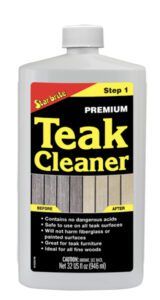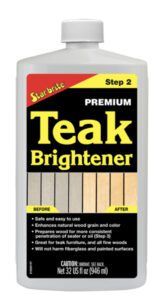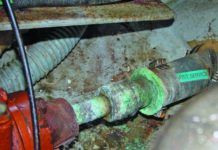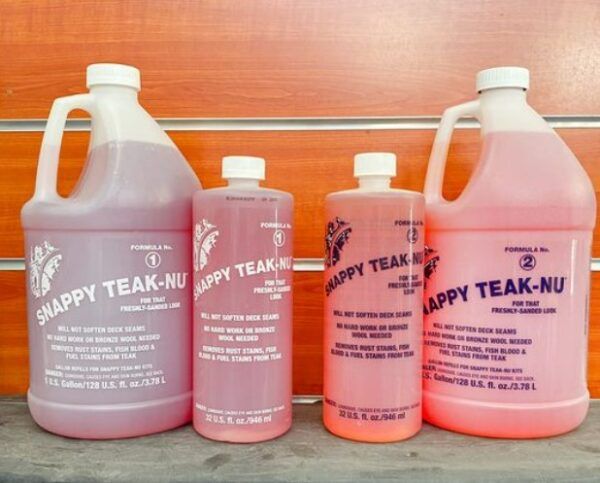Aboard our Privilege 435 catamaran Confianza, we are teak oilers, not varnishers. Accordingly, our teak needs regular elbow grease. In our (seemingly never-ending) quest for the right teak cleaner, we decided to do a face-off between the two most-often recommended products: Snappy Teak-Nu and Star Brite Teak Cleaner. With a weathered table and worn-out bow pulpit seats, we embarked on a side-by-side comparison. After the test, we thought Snappy Teak-Nu was going to be a winner, but a few weeks out gave us a different story.
Deciding to Give Snappy Teak-Nu a Try
Our journey began with a couple of YouTube video demonstrations of Snappy Teak-Nu, sparking our curiosity to test it out on our heavily weathered teak table. When we went to the local marine surplus and chandlery in Daytona Beach, Florida, one of the employees even commented: “That’s what all the super yacht guys use.” We figured we must be on the right track.

The table was a mess from sitting in a boatyard, mostly uncovered, while our repower project dragged on from the initial two months to over six months. Normally we take great care of this table, but, alas, it was in a sorry state. The splotchiness is a symptom of using the Star Brite Teak cleaner and brightener originally, and then failing to keep up with the oiling. As the oil washed out, the unprotected parts started to darken and grow mold.

My co-captain Angie was initially very impressed with this new-to-us product. It did take a whole three treatments, but it appeared to completely restore the table! SPOILER: It didn’t last. More on that later on. After we were generally satisfied with the result, Angie questioned how it compared to the cheaper and generally more available Star Brite Teak Cleaner & Star Brite Teak Brightener, which is our usual go-to.
The Showdown
Our weathered seats up in the twin pulpits of our cat provided an ideal testing ground, as it gave us two equally water- and sun-damaged platforms to work with—an area in dire need of some TLC.

On the port side, we enlisted the help of the Star Brite Teak Cleaner set. Meanwhile, on the starboard side, the Snappy Teak-Nu stepped up to the plate. Both products come in two parts, but the specifics of their chemical compositions seem quite different. Snappy Teak-Nu uses a strong acid followed by a neutralizing basic solution.
As far as we can tell, the acidic components in Snappy Teak-Nu play a role in breaking down dirt, grime, mold and other contaminants that can accumulate on teak wood over time. These acids help to dissolve the buildup and restore the wood’s natural color and appearance. However, because of the presence of these acids, there is a lot of debate on whether it’s damaging to the teak. The acid is supposed to be neutralized with a basic solution and the dirt washes away with water.

The Star Brite kit is made up of two parts as well—a Cleaner and a Brightener. Again, as far as we can tell, Star Brite Teak Cleaner is generally not categorized as a strong acid-based cleaner, though it does contain acid components. Instead, it seems to employ a combination of detergents, surfactants and other cleaning agents to remove dirt, stains and weathering from teak wood surfaces. As the formula is not published, we can only make certain assumptions. The brightener is even more of a mystery.
The Experience
Applying Snappy Teak-Nu felt very satisfying. As the product transformed into a tar-like mud, it seemed to be waging a successful war against dirt and grime. On the other hand, Star Brite lacked the dramatic visuals during the process, but its results were on par with its competitor. Three rounds of treatments ensued for each side, with comparable scrubbing efforts for both products. Neither stood out as exceptionally easier or harder to use.
Post-treatment, a visual divergence emerged. The Star Brite-treated side displayed a more bleached appearance, while the Snappy Teak-Nu side retained more of the coveted amber wood color. Initial favoritism for Snappy Teak-Nu began to take root.
The Plot Thickens
As time passed, there was an unexpected turn of events. The Snappy Nu-treated side exhibited a fibrous film that stubbornly clung to the wood after the cleaning process. Despite applying two coats of Star Brite teak oil, the issue persisted.

It appeared as if there was pulp peeling away from the wood, and we now expect we will have to sand and refinish some of these surfaces. It was most visible on the table, more so than on the bow seat surface tests, and I expect to have to refinish all these surfaces in the near future.
The Problem with Snappy Teak-Nu
Delving into the Snappy Teak-Nu experience, we uncovered some concerning issues. The destruction of wood fibers became evident through our tests on the table and also a door frame. The cleaner seemed to remove material from the grain, emphasizing the grain’s raised relief. Another crucial problem emerged: the growing presence of mold in the teak’s crevices. Less pulp in the grain led to quicker mold growth—a challenge we hadn’t anticipated. There is also a fuzzy film appearing over the surface that seems like further pulp lifting away from the wood.
The instructions do say to give the wood a scrub with a stiff bristled brush, and maybe we were supposed to remove more of this wood pulp. But the brush also was digging out the grain in the teak. Teak grain is very soft compared to the very hard wood. And aggressive scrubbing over time will create big peaks and valleys in the wood. This attracts the very mold that we are trying to get rid of in the first place!
Final Thoughts
Two months in, the Star Brite side emerged victorious, presenting a more appealing appearance. We were not happy with how the Snappy Teak-Nu surface ages. While Snappy Teak-Nu showcased impressive initial results, its long-term effects raised concerns. Star Brite, with its reliable performance and lasting vibrancy, emerged as the preferred choice in our experiment. Next project: Doing an actual sanding and restoration to bring our teak fully back to its original glory.
This article was originally published on 23 April 2024 and has been updated.




































The conventional wisdom is that acid-based teak cleaners remove as much as 0.01 inches of wood with each deep cleaning. That’s 0.1 inches, or about as much as you can afford before deck failure begins. These cleaners are a useful restoration tool, but they are not for regular, or even annual, cleaning. Use gentler cleaners, such as borax, or just a seawater scrub, for routine cleaning.
See also in PS, “spiffy Teak Tips for the Penny Pincher,” March 2016, for further discussion of gentler cleaning methods.